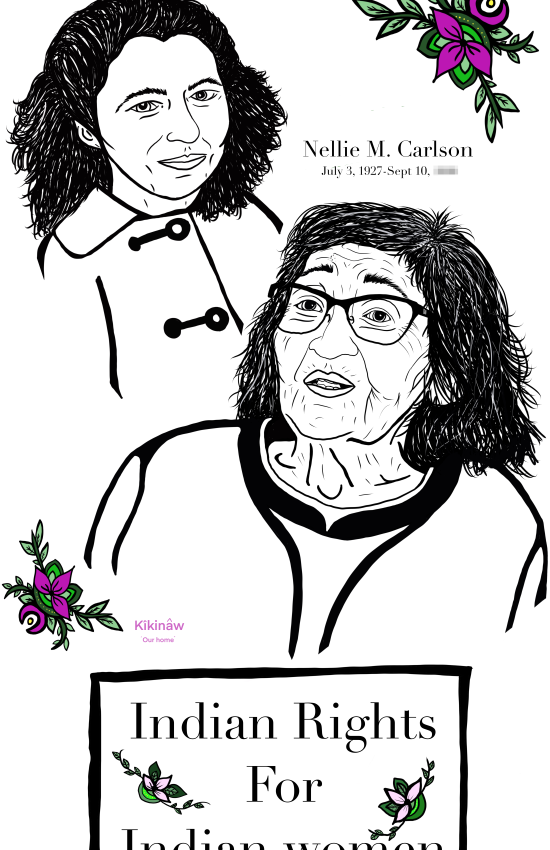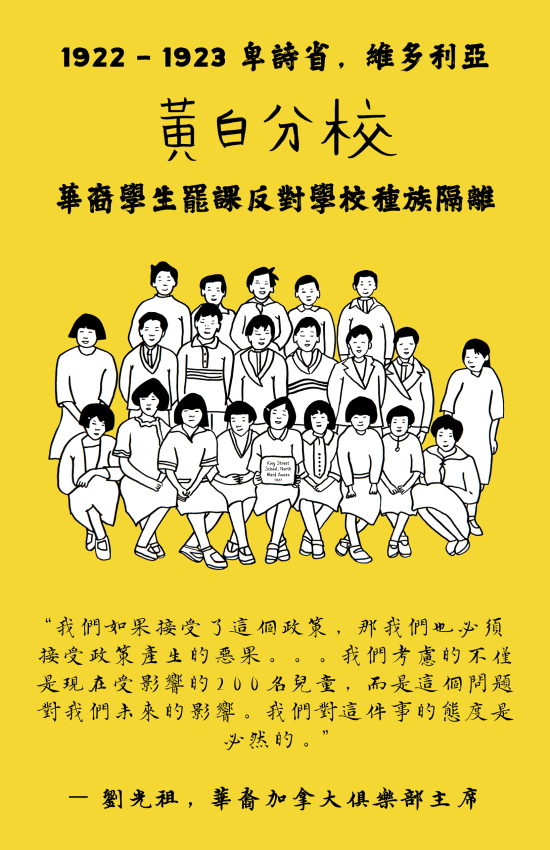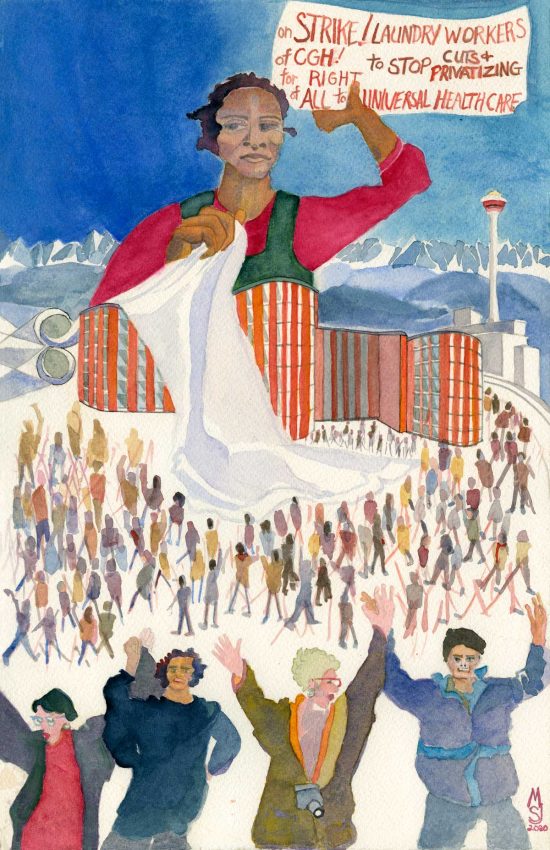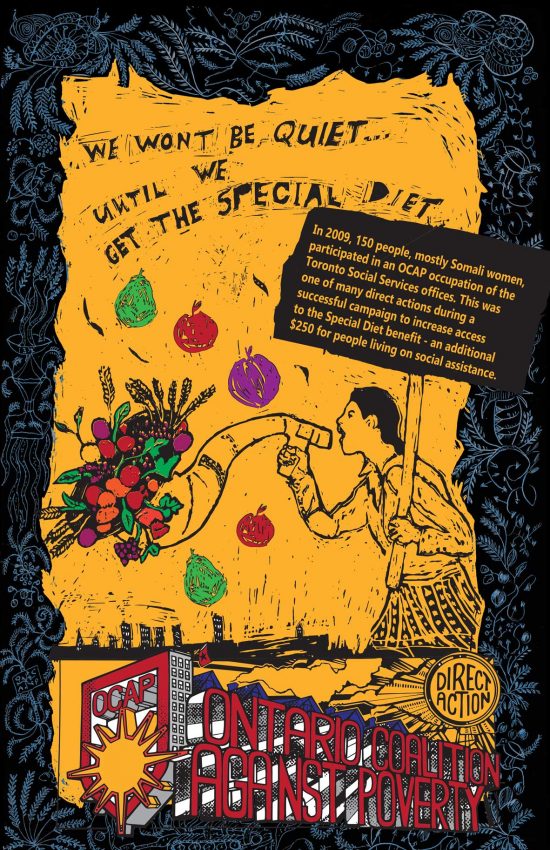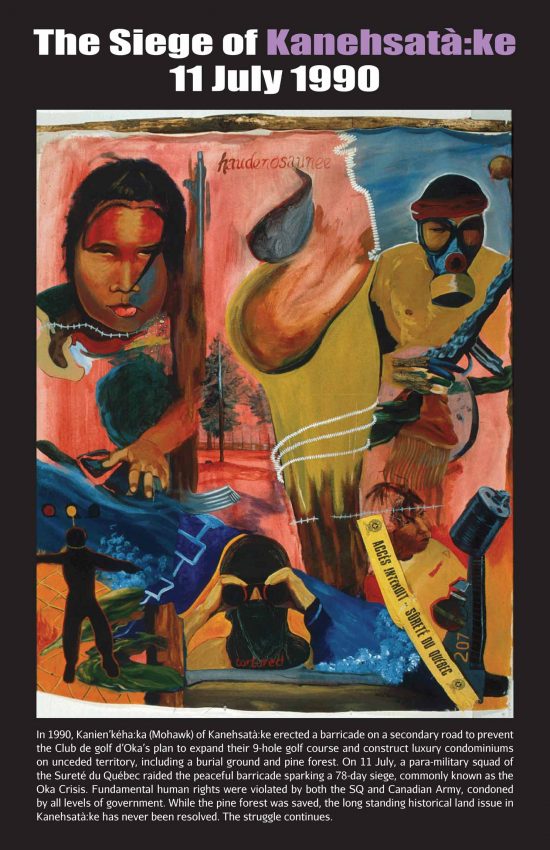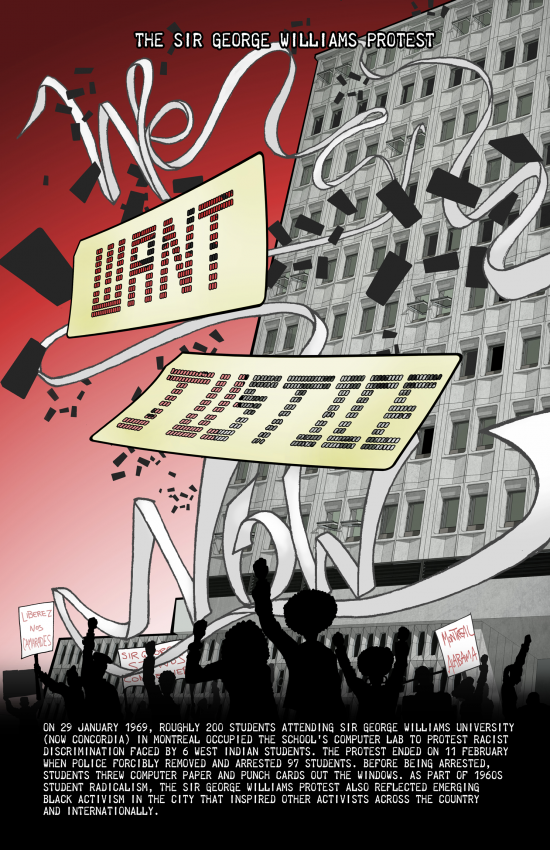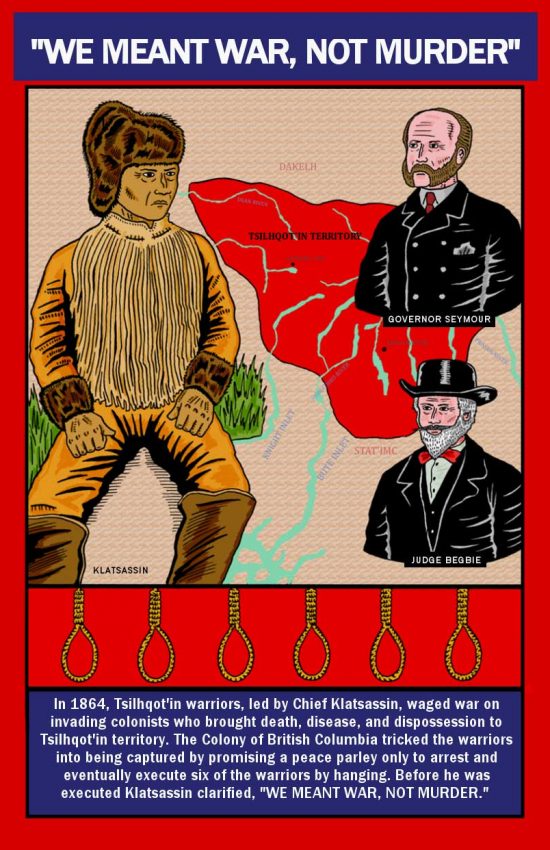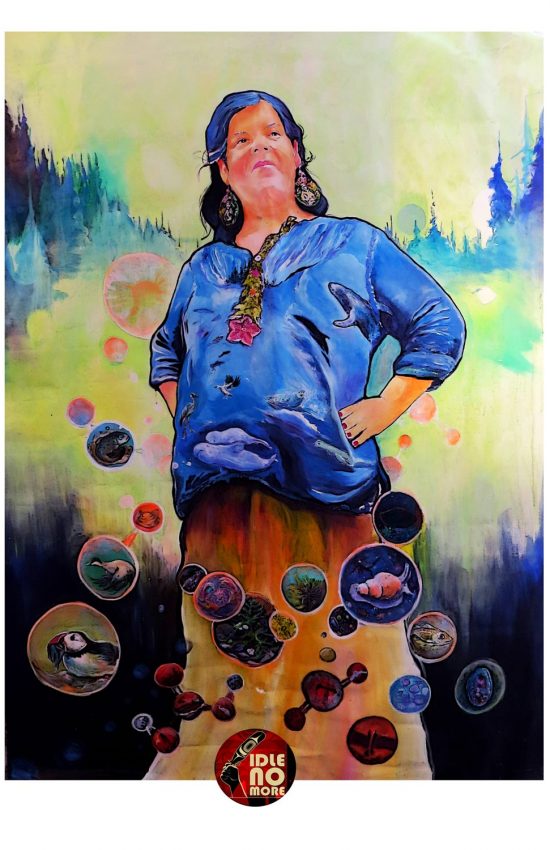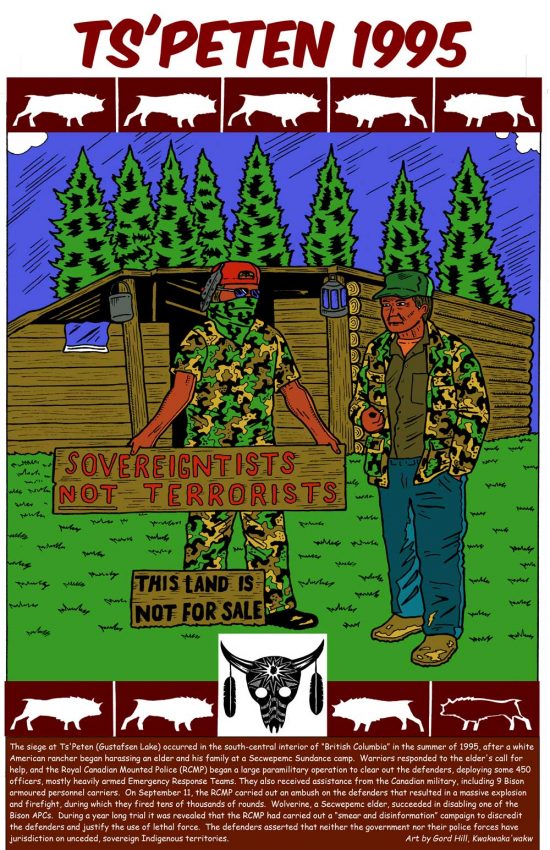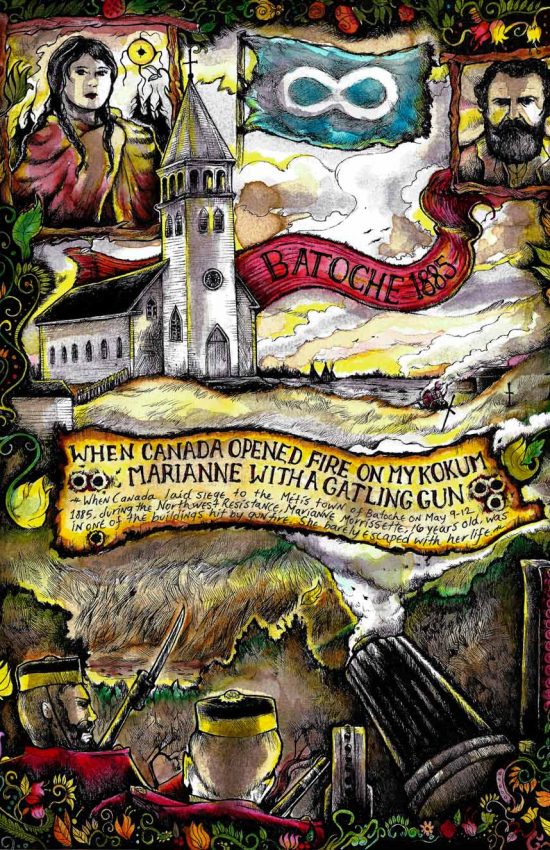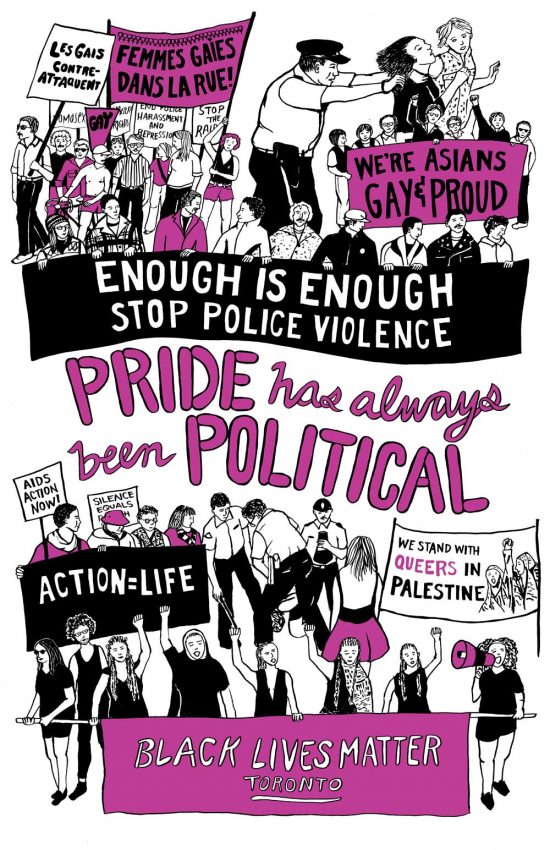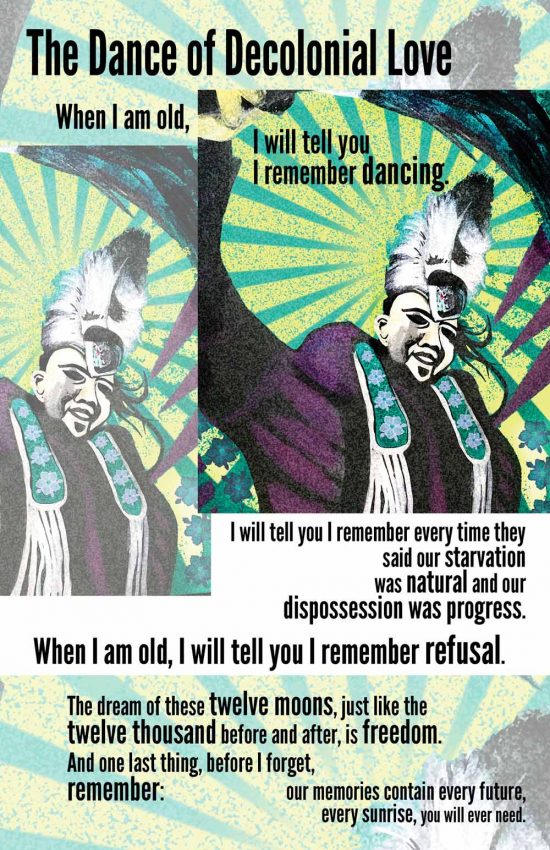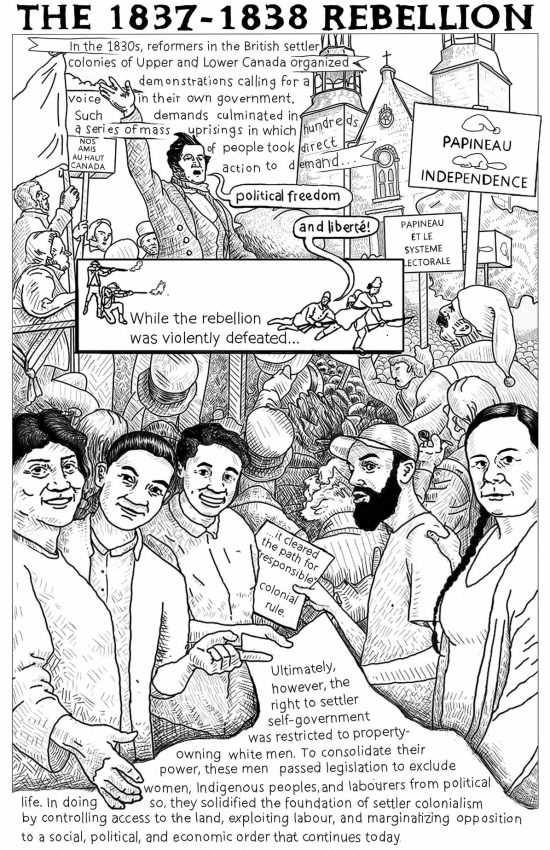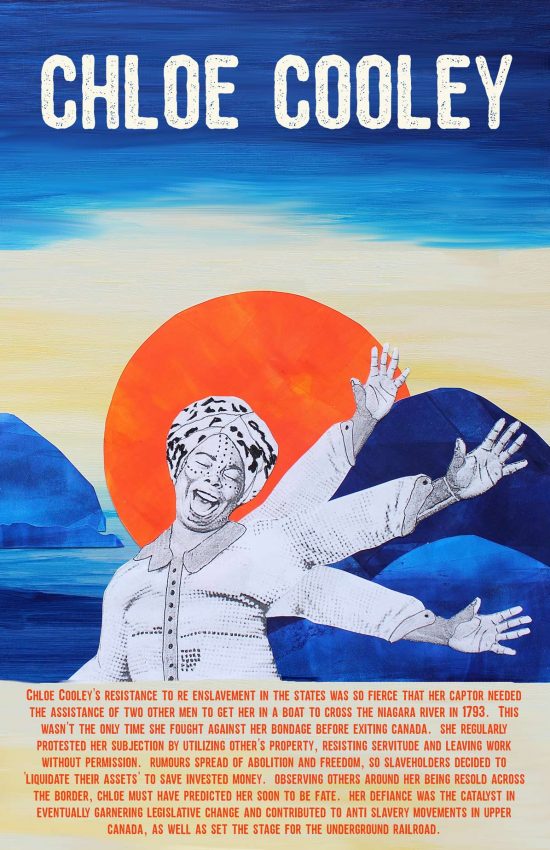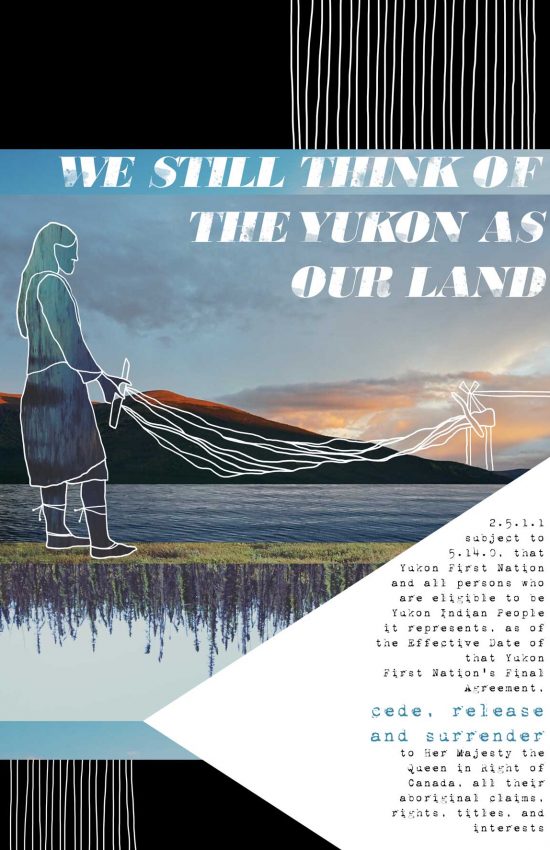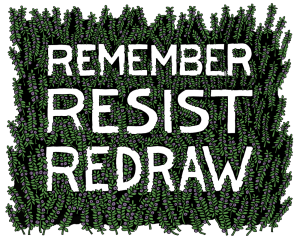 In 2017, the Graphic History Collective launched Remember | Resist | Redraw: A Radical History Poster Project, a collaborative project featuring works by artists and writers committed to promoting art, activism, and history in what is today known as Canada.
In 2017, the Graphic History Collective launched Remember | Resist | Redraw: A Radical History Poster Project, a collaborative project featuring works by artists and writers committed to promoting art, activism, and history in what is today known as Canada.
Remember | Resist | Redraw posters offer alternative perspectives on well-known historical events, and highlights histories of Indigenous peoples, women, workers, and the historically oppressed people that are often overlooked or marginalized in mainstream historical accounts.
We want to share these posters widely. The posters are available for free for personal, educational, and activist use. See how you can use the posters and support this project. If you are interested in exhibiting or publishing the posters, please read our guidelines and get in touch.
In order to change the world, we need to be able to imagine ways of living and organizing to bring about social change. We combine art and history because it helps us fuel our radical imaginations and dream of what might be. Activist art encourages us to remember, resist, and redraw our world with an eye to changing it for the better.

- 1793
Chloe Cooley’s Resistance to Enslavement
Chloe Cooley’s Resistance to Enslavement
March 14, 1793 Chloe Cooley’s resistance to re-enslavement in the States was so fierce that her captor needed the assistance of two other men to get her in a boat to cross the Niagara River in 1793. This wasn’t the only time she fought against her bondage before exiting Canada. Her defiance was the catalyst in eventually garnering […]
Chloe Cooley’s resistance to re-enslavement in the States was so fierce that her captor needed the assistance of two other men to get her in a boat to cross the Niagara River in 1793. This wasn’t the only time she fought against her bondage before exiting Canada. Her defiance was the catalyst in eventually garnering […] - 1837
The 1837–1838 Rebellion: Consolidating Settler Colonialism in Canada
The 1837–1838 Rebellion: Consolidating Settler Colonialism in Canada
October 23, 1837 In the 1830s the struggle to abolish irresponsible colonial rule in Upper and Lower Canada, and replace it with a form of government controlled by local settlers rather than by imperial rulers or their appointed representatives, involved significant debate, public protest, threats of violence, and outright rebellion. While the 1837-1838 Rebellion is often celebrated as […]
In the 1830s the struggle to abolish irresponsible colonial rule in Upper and Lower Canada, and replace it with a form of government controlled by local settlers rather than by imperial rulers or their appointed representatives, involved significant debate, public protest, threats of violence, and outright rebellion. While the 1837-1838 Rebellion is often celebrated as […] - 1864
The Tsilhqot’in War
The Tsilhqot’in War
October 15, 1864 In 1864, Tsilhqot’in warriors, led by Chief Klatsassin, waged war on invading colonists who brought death, disease, and dispossession to Tsilhqot’in territory. The Colony of British Columbia tricked the warriors into being captured by promising a peace parley only to arrest and eventually execute six of the warriors by hanging. Before he was executed Klatsassin […]
In 1864, Tsilhqot’in warriors, led by Chief Klatsassin, waged war on invading colonists who brought death, disease, and dispossession to Tsilhqot’in territory. The Colony of British Columbia tricked the warriors into being captured by promising a peace parley only to arrest and eventually execute six of the warriors by hanging. Before he was executed Klatsassin […] - 1883
John A. Macdonald: Father of Confederation, Architect of Genocide
John A. Macdonald: Father of Confederation, Architect of Genocide
May 9, 1883 John A. Macdonald (1815-1891) is often celebrated for his role as one of Canada’s “Fathers of Confederation.” What is lesser known, however, is that Macdonald, as prime minister, played a pivotal role in creating Canada’s destructive system of Indian Residential Schools that sought to “kill the Indian in the child.” Foundational to Macdonald’s agenda was […]
John A. Macdonald (1815-1891) is often celebrated for his role as one of Canada’s “Fathers of Confederation.” What is lesser known, however, is that Macdonald, as prime minister, played a pivotal role in creating Canada’s destructive system of Indian Residential Schools that sought to “kill the Indian in the child.” Foundational to Macdonald’s agenda was […] - 1885
Conservation is Colonialism
Conservation is Colonialism
January 1, 1885 Beginning in the 1880s and intensifying in the early 1900s, the federal government created a national network of parks that conserved “natural” areas and commodified them to contribute to the capitalist economy and nation-building. As part of this process, many Indigenous communities were forcibly displaced within the newly-established park boundaries. Starting in 1885, my ancestors, […]
Beginning in the 1880s and intensifying in the early 1900s, the federal government created a national network of parks that conserved “natural” areas and commodified them to contribute to the capitalist economy and nation-building. As part of this process, many Indigenous communities were forcibly displaced within the newly-established park boundaries. Starting in 1885, my ancestors, […] - 1885
When Canada Opened Fire on My Kokum Marianne With a Gatling Gun
When Canada Opened Fire on My Kokum Marianne With a Gatling Gun
May 9, 1885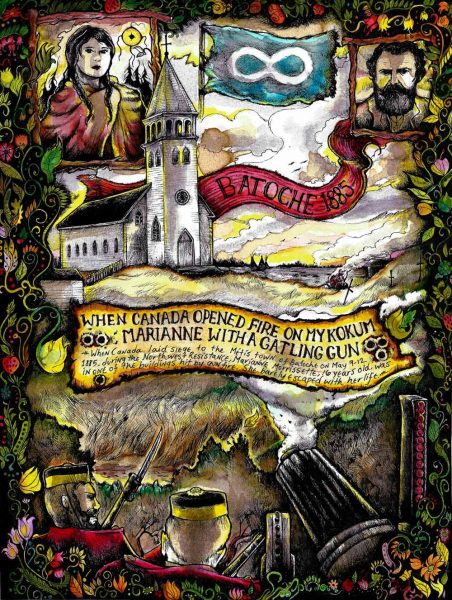 Resenting the fact that their land was sold without consultation, the Métis took up arms against Canada in 1869, under the leadership of Louis Riel. The Métis Resistance was successful, and after a series of negotiations, the Métis entered Confederation with Canada with the 1870 Manitoba Act, which created the province of Manitoba. At Batoche, […]
Resenting the fact that their land was sold without consultation, the Métis took up arms against Canada in 1869, under the leadership of Louis Riel. The Métis Resistance was successful, and after a series of negotiations, the Métis entered Confederation with Canada with the 1870 Manitoba Act, which created the province of Manitoba. At Batoche, […] - 1900
Caregiving Work in Canada 1900-2016
Caregiving Work in Canada 1900-2016
April 16, 1900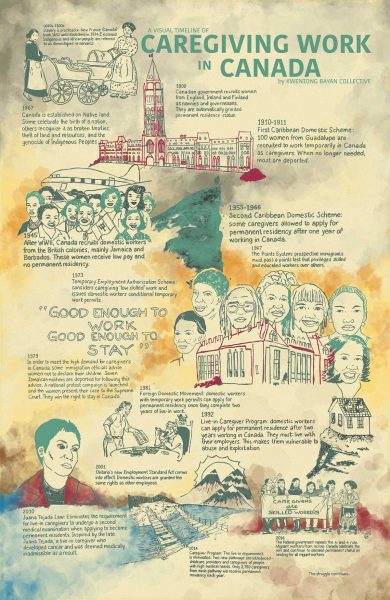 Canadian families have always relied on domestic workers. This was true before Confederation, when Canadian families used Indigenous and Black women as slaves. This was also true afterwards, when the Canadian government recruited women from overseas to work as domestic workers. Due to its “white settler” policy, the Canadian government recruited British and Western European […]
Canadian families have always relied on domestic workers. This was true before Confederation, when Canadian families used Indigenous and Black women as slaves. This was also true afterwards, when the Canadian government recruited women from overseas to work as domestic workers. Due to its “white settler” policy, the Canadian government recruited British and Western European […] - 1914
Canada’s Internment of Ukrainians, 1914–1920
Canada’s Internment of Ukrainians, 1914–1920
August 22, 1914 Between 1914 and 1920, the Canadian government used the War Measures Act to intern 8,579 people, including 4,000 Ukrainians, all recent migrants from the Austro-Hungarian Empire. Internees responded to the ill treatment and exploitation they experienced with insubordination and resistance. They engaged in sabotage, like work slowdowns, and, in some instances, rioted or struck for […]
Between 1914 and 1920, the Canadian government used the War Measures Act to intern 8,579 people, including 4,000 Ukrainians, all recent migrants from the Austro-Hungarian Empire. Internees responded to the ill treatment and exploitation they experienced with insubordination and resistance. They engaged in sabotage, like work slowdowns, and, in some instances, rioted or struck for […] - 1919
The Flu Pandemic: Health Inequity and Social Change
The Flu Pandemic: Health Inequity and Social Change
January 1, 1919 Although long referred to by historians as the “forgotten pandemic,” countless families and communities have memories of the 1918–1920 flu: stories of their people, how they persisted, and how their lives were changed by a disease outbreak that killed over 50,000 Canadians and at least 50 million globally. For much of the 20th century, history […]
Although long referred to by historians as the “forgotten pandemic,” countless families and communities have memories of the 1918–1920 flu: stories of their people, how they persisted, and how their lives were changed by a disease outbreak that killed over 50,000 Canadians and at least 50 million globally. For much of the 20th century, history […] - 1919
The Winnipeg General Strike
The Winnipeg General Strike
May 1, 1919 In May and June 1919, 35,000 workers in Winnipeg, Manitoba staged a six-week general strike. Workers from various backgrounds struck for higher wages and collective bargaining rights and to demand more power for working people. Ultimately, the strike was violently crushed by police acting on the orders of politicians and the city’s capitalists. Although the […]
In May and June 1919, 35,000 workers in Winnipeg, Manitoba staged a six-week general strike. Workers from various backgrounds struck for higher wages and collective bargaining rights and to demand more power for working people. Ultimately, the strike was violently crushed by police acting on the orders of politicians and the city’s capitalists. Although the […] - 1922
We are Inuit – Not Your Flag Poles
We are Inuit – Not Your Flag Poles
July 8, 1922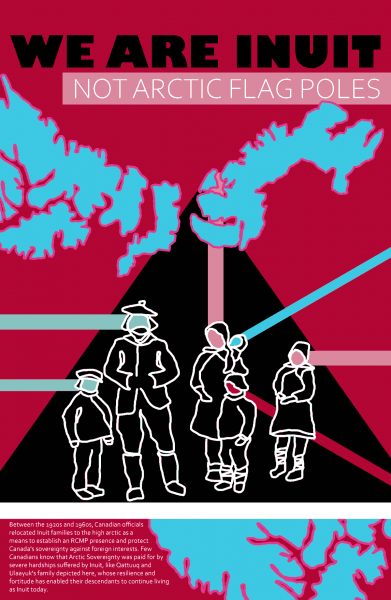 Between the 1920s and 1960s, Canadian officials relocated Inuit families to the high arctic as a means to establish an RCMP presence and protect Canada’s sovereignty against foreign interests. Few Canadians know that Arctic Sovereignty was paid for by severe hardships suffered by Inuit, like Qattuuq and Ulaayuk’s family depicted here, whose resilience and fortitude […]
Between the 1920s and 1960s, Canadian officials relocated Inuit families to the high arctic as a means to establish an RCMP presence and protect Canada’s sovereignty against foreign interests. Few Canadians know that Arctic Sovereignty was paid for by severe hardships suffered by Inuit, like Qattuuq and Ulaayuk’s family depicted here, whose resilience and fortitude […] - 1922
Chinese students strike against segregated schools
Chinese students strike against segregated schools
September 5, 1922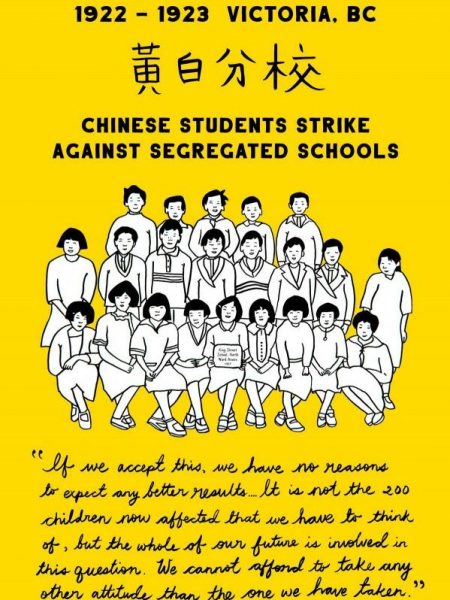 In July 1922, the Victoria School District Board voted to exclusively segregate all racialized Chinese students. When the order came into effect on September 5th, Chinese students were called out of their classes and marched down the road. Upon reaching one of the newly-established Chinese-only schools an older boy gave a pre-arranged signal and students […]
In July 1922, the Victoria School District Board voted to exclusively segregate all racialized Chinese students. When the order came into effect on September 5th, Chinese students were called out of their classes and marched down the road. Upon reaching one of the newly-established Chinese-only schools an older boy gave a pre-arranged signal and students […] - 1925
Cape Breton Coal Strikes
Cape Breton Coal Strikes
April 16, 1925 “They can’t stand the gaff!” The words failed to intimidate the coal miners. Instead, the insult contributed to their resistance, and “standing the gaff” became a rallying cry during the long 1925 strike. That strike was the culmination of the labour war in the Nova Scotia coal mines in the 1920s, an episode of class conflict […]
“They can’t stand the gaff!” The words failed to intimidate the coal miners. Instead, the insult contributed to their resistance, and “standing the gaff” became a rallying cry during the long 1925 strike. That strike was the culmination of the labour war in the Nova Scotia coal mines in the 1920s, an episode of class conflict […] - 1933
Radical Bookshops in 1930s Montreal
Radical Bookshops in 1930s Montreal
January 1, 1933 The Modern Book Shop and the Hidden Book Shop were important spaces for radical education and organization in Montreal between 1933 and 1938. As such they were frequently targeted by fascists and the police for selling “seditious literature,” mostly from communist newspapers like Vie ouvrière, a communist monthly, The Daily Clarion from Toronto, and Clarté. Read More
The Modern Book Shop and the Hidden Book Shop were important spaces for radical education and organization in Montreal between 1933 and 1938. As such they were frequently targeted by fascists and the police for selling “seditious literature,” mostly from communist newspapers like Vie ouvrière, a communist monthly, The Daily Clarion from Toronto, and Clarté. Read More - 1939
The Most Dangerous Woman in the World
The Most Dangerous Woman in the World
April 16, 1939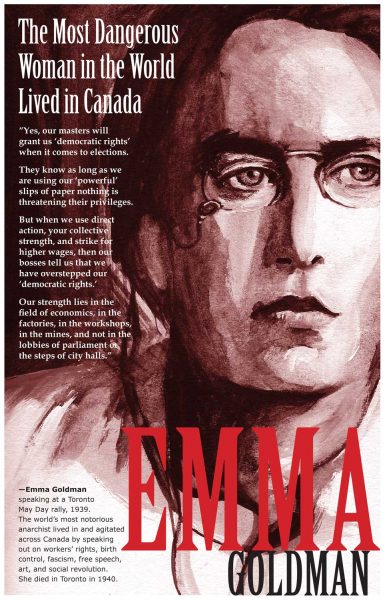 Emma Goldman was born in 1869 to a Jewish family in Kaunas, Lithuania. Fleeing the pogroms of Europe, she immigrated to the United States in 1885 and committed herself to anarchism. She was deported in 1919 for her anti-war activities, and then after years of exile in Europe, Goldman came to Canada in 1939. She […]
Emma Goldman was born in 1869 to a Jewish family in Kaunas, Lithuania. Fleeing the pogroms of Europe, she immigrated to the United States in 1885 and committed herself to anarchism. She was deported in 1919 for her anti-war activities, and then after years of exile in Europe, Goldman came to Canada in 1939. She […] - 1942
The Japanese Canadian Internment
The Japanese Canadian Internment
February 26, 1942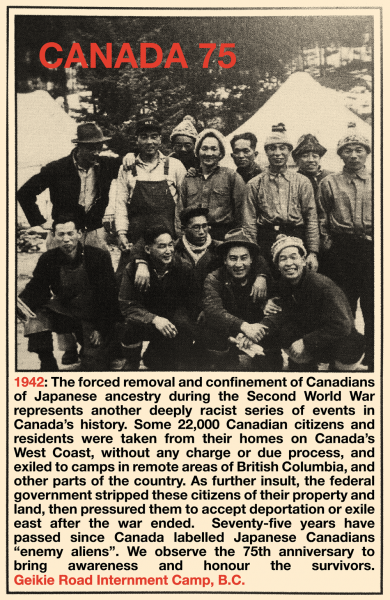 In 1942, the federal government labeled 22,000 Japanese Canadians (over 75% were Canadian citizens) “enemy aliens.” In response to Japan’s attack on Pearl Harbour in 1941, Canada declared war against Japan. Soon after, without any charge or due process, the government forcibly relocated Canadians of Japanese heritage living on the West Coast to internment camps […]
In 1942, the federal government labeled 22,000 Japanese Canadians (over 75% were Canadian citizens) “enemy aliens.” In response to Japan’s attack on Pearl Harbour in 1941, Canada declared war against Japan. Soon after, without any charge or due process, the government forcibly relocated Canadians of Japanese heritage living on the West Coast to internment camps […] - 1948
Operation Profunc 1948-1983
Operation Profunc 1948-1983
January 22, 1948 RCMP spying’s extent and secrecy was the thirty-five-year long covert program that began in 1948: Operation Profunc (PROminent FUNCtionaries of the Communist or Labor Progressive Party). This program planned to arrest Canadians in the event of a Communist-led attack or a leftist insurgence from within Canada’s own borders. Those arrested Canadians would be interned in […]
RCMP spying’s extent and secrecy was the thirty-five-year long covert program that began in 1948: Operation Profunc (PROminent FUNCtionaries of the Communist or Labor Progressive Party). This program planned to arrest Canadians in the event of a Communist-led attack or a leftist insurgence from within Canada’s own borders. Those arrested Canadians would be interned in […] - 1968
1968-2017: Intergenerational Resistance in Vancouver’s Chinatown
1968-2017: Intergenerational Resistance in Vancouver’s Chinatown
February 7, 1968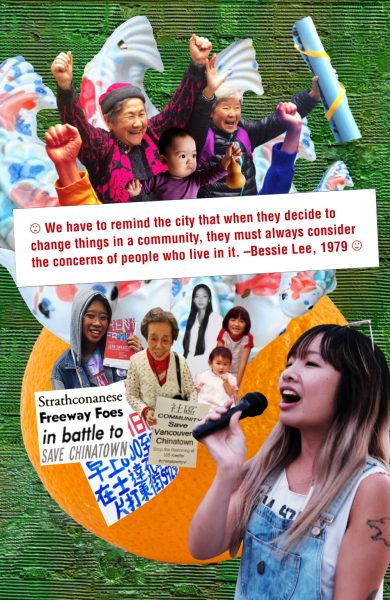 In 1968, Bessie Lee, along with women and mothers of the community, co-founded the Strathcona Property Owner’s and Tenants Association (SPOTA) to stop “urban renewal” plans from the City of Vancouver, including the construction of a freeway that would demolish the neighbourhood. Through these efforts, they stopped the freeway from being built and spared neighbourhood […]
In 1968, Bessie Lee, along with women and mothers of the community, co-founded the Strathcona Property Owner’s and Tenants Association (SPOTA) to stop “urban renewal” plans from the City of Vancouver, including the construction of a freeway that would demolish the neighbourhood. Through these efforts, they stopped the freeway from being built and spared neighbourhood […] - 1969
The Sir George Williams Protest
The Sir George Williams Protest
January 29, 1969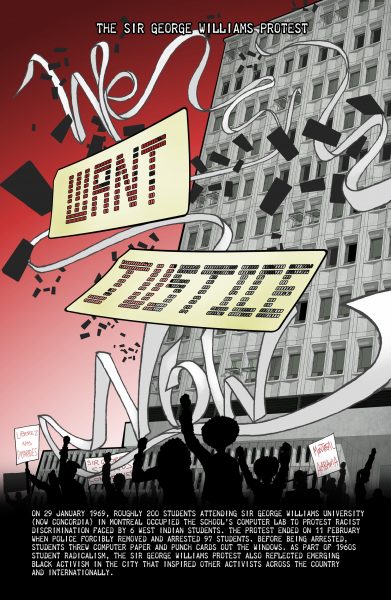 On 29 January 1969, roughly 200 students attending Sir George Williams University (now Concordia) in Montreal occupied the school’s computer lab to protest racist discrimination faced by six West Indian Students. The protest ended on 11 February when police forcibly removed and arrested 97 students. Before being arrested, students threw computer paper and punch cards […]
On 29 January 1969, roughly 200 students attending Sir George Williams University (now Concordia) in Montreal occupied the school’s computer lab to protest racist discrimination faced by six West Indian Students. The protest ended on 11 February when police forcibly removed and arrested 97 students. Before being arrested, students threw computer paper and punch cards […] - 1973
We Still Think of the Yukon as Our Land
We Still Think of the Yukon as Our Land
March 13, 1973 “We still think of the Yukon as our land,” wrote the Yukon Indian People in Together Today for Our Children Tomorrow, a document created by the Council of Yukon Indians (now, Council for Yukon First Nations) and submitted to Prime Minister Pierre Elliott Trudeau in 1973. The document outlined a series of grievances that Indigenous […]
“We still think of the Yukon as our land,” wrote the Yukon Indian People in Together Today for Our Children Tomorrow, a document created by the Council of Yukon Indians (now, Council for Yukon First Nations) and submitted to Prime Minister Pierre Elliott Trudeau in 1973. The document outlined a series of grievances that Indigenous […] - 1975
Justice for Grassy Narrows
Justice for Grassy Narrows
August 1, 1975 For the past 50 years, women, youth, and the community have led a movement to address the industrial mercury poisoning of their people, to protect their land, and assert their sovereignty. We remember those who are no longer here, those who are fighting today, and the future generations of resistance. Read More
For the past 50 years, women, youth, and the community have led a movement to address the industrial mercury poisoning of their people, to protect their land, and assert their sovereignty. We remember those who are no longer here, those who are fighting today, and the future generations of resistance. Read More - 1977
Pride Has Always Been Political: 1970s – 2016
Pride Has Always Been Political: 1970s – 2016
June 28, 1977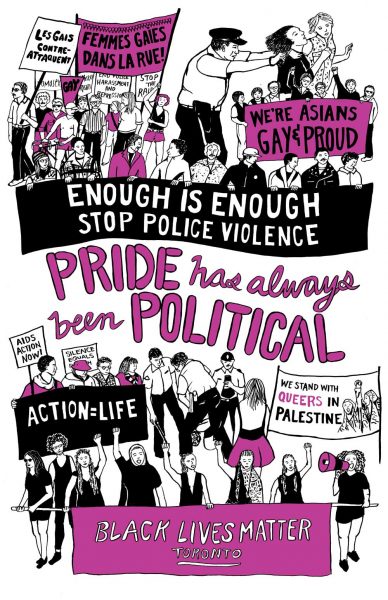 Pride started off as the celebration of the rebellious origins of the queer and trans liberation movements in resistance to police repression in the later 1960s. In so-called Canada, Pride originated in the Montréal resistance to the Olympic police repression in 1976 and to the raid on the Truxx bar in 1977. It was these […]
Pride started off as the celebration of the rebellious origins of the queer and trans liberation movements in resistance to police repression in the later 1960s. In so-called Canada, Pride originated in the Montréal resistance to the Olympic police repression in 1976 and to the raid on the Truxx bar in 1977. It was these […] - 1983
Kent Prisoner’s Hunger Strike
Kent Prisoner’s Hunger Strike
April 18, 1983 In late March, 1983, two Indigenous men began a hunger strike at Kent prison in Agassiz, BC protesting the prison’s unwillingness to provide access to spiritual practices. Prison officials refused to take action, by mid-April, eighteen other Indigenous prisoners joined the strike. On April 18, Sts’ailes Stó:lō woman Rose Charlie, president of the BC Indian […]
In late March, 1983, two Indigenous men began a hunger strike at Kent prison in Agassiz, BC protesting the prison’s unwillingness to provide access to spiritual practices. Prison officials refused to take action, by mid-April, eighteen other Indigenous prisoners joined the strike. On April 18, Sts’ailes Stó:lō woman Rose Charlie, president of the BC Indian […] - 1988
Charles Roach: Warrior, Prince, and Servant of His People
Charles Roach: Warrior, Prince, and Servant of His People
January 11, 1988 In 1988, the iconoclastic Charles Roach launched a battle against the Canadian government to remove the oath to the Queen as a condition of Canadian citizenship. In 1992, the Court of Appeal threw his case out, but in 2012 Roach, battling a life threatening illness, launched a similar suit: “I cannot see myself taking the […]
In 1988, the iconoclastic Charles Roach launched a battle against the Canadian government to remove the oath to the Queen as a condition of Canadian citizenship. In 1992, the Court of Appeal threw his case out, but in 2012 Roach, battling a life threatening illness, launched a similar suit: “I cannot see myself taking the […] - 1990
The Seige of Kanehsatà:ke
The Seige of Kanehsatà:ke
July 11, 1990 In 1990, Kanien’kéha:ka (Mohawk) of Kanehsatà:ke erected a barricade on a secondary road to prevent the Club de golf d’Oka’s plan to expand their 9-hole golf course and construct luxury condominiums on unceded territory, including a burial ground and pine forest. On 11 July, a para-military squad of the Sureté du Québec raided the peaceful […]
In 1990, Kanien’kéha:ka (Mohawk) of Kanehsatà:ke erected a barricade on a secondary road to prevent the Club de golf d’Oka’s plan to expand their 9-hole golf course and construct luxury condominiums on unceded territory, including a burial ground and pine forest. On 11 July, a para-military squad of the Sureté du Québec raided the peaceful […] - 1995
Ts’Peten 1995
Ts’Peten 1995
July 15, 1995 The siege of Ts’Peten (Gustafsen Lake) occurred in the south-central interior of “British Columbia” in the summer of 1995, after a white American ranger began harassing an Elder and his family at ta Secwepemc Sundance camp. Warriors responded to the Elder’s call for help, and the Royal Canadian Mounted Police (RCMP) began a large paramilitary […]
The siege of Ts’Peten (Gustafsen Lake) occurred in the south-central interior of “British Columbia” in the summer of 1995, after a white American ranger began harassing an Elder and his family at ta Secwepemc Sundance camp. Warriors responded to the Elder’s call for help, and the Royal Canadian Mounted Police (RCMP) began a large paramilitary […] - 1995
Calgary Laundry Workers Strike
Calgary Laundry Workers Strike
November 14, 1995 In the early 1990s the Alberta Progressive Conservative government began a campaign of eliminated tens of thousands of public sector jobs and cutting wages. In 1995, when the Calgary Health Authority announced a contracting out of hospital laundry workers’ jobs, 60 laundry workers called in sick. Within ten days about 2,500 workers in six hospitals […]
In the early 1990s the Alberta Progressive Conservative government began a campaign of eliminated tens of thousands of public sector jobs and cutting wages. In 1995, when the Calgary Health Authority announced a contracting out of hospital laundry workers’ jobs, 60 laundry workers called in sick. Within ten days about 2,500 workers in six hospitals […] - 2009
OCAP Confronts Austerity in Ontario
OCAP Confronts Austerity in Ontario
December 1, 2009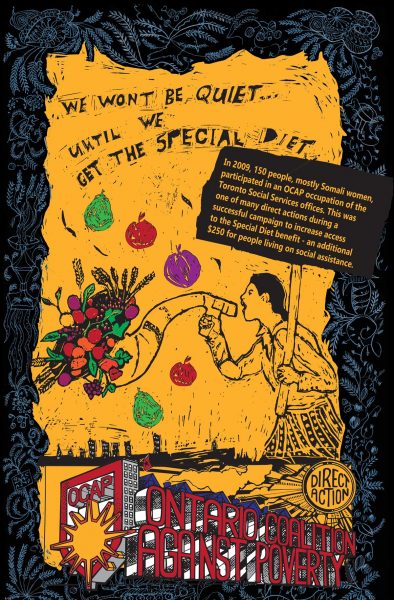 In 2009, 150 people, mostly Somali women, participated in an OCAP occupation of the Toronto Social Services offices. This was one of many direct actions during a successful campaign to increase access to the Special Diet benefit — an additional $250 for people living on social assistance. Read More
In 2009, 150 people, mostly Somali women, participated in an OCAP occupation of the Toronto Social Services offices. This was one of many direct actions during a successful campaign to increase access to the Special Diet benefit — an additional $250 for people living on social assistance. Read More - 2012
Idle No More Quebec
Idle No More Quebec
October 11, 2012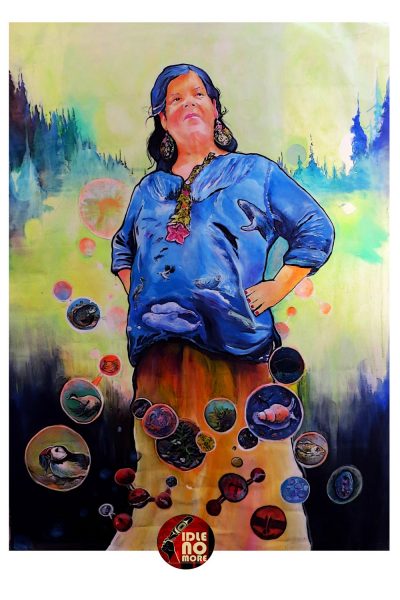 Melissa Mollen Dupuis is an Innu woman, mother, leader, cultural ambassador, and co-organizer of the Idle No More movement in the area known today as Quebec. Water protection is a sacred responsibility of all women. Being pregnant shows the continuity of the stewardship of this sacred river (Shipu — “river” in Innu) that connects us […]
Melissa Mollen Dupuis is an Innu woman, mother, leader, cultural ambassador, and co-organizer of the Idle No More movement in the area known today as Quebec. Water protection is a sacred responsibility of all women. Being pregnant shows the continuity of the stewardship of this sacred river (Shipu — “river” in Innu) that connects us […] - 2012
Idle No More: The Dance of Decolonial Love
Idle No More: The Dance of Decolonial Love
November 1, 2012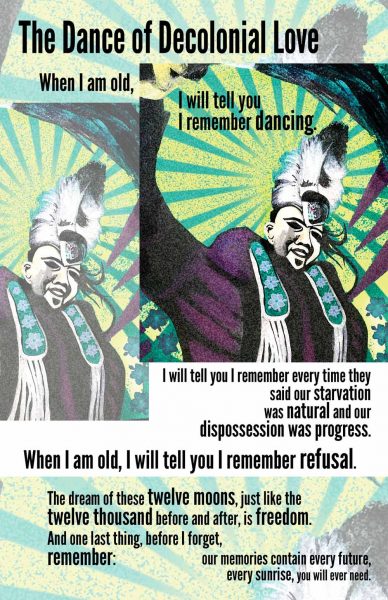 When I am old, I will tell you I remember dancing. I will tell you I remember every time they said our starvation was natural and our dispossession was progress. When I am old, I will tell you I remember refusal. The dream of these twelve moons, just like the twelve thousand before and after, […]
When I am old, I will tell you I remember dancing. I will tell you I remember every time they said our starvation was natural and our dispossession was progress. When I am old, I will tell you I remember refusal. The dream of these twelve moons, just like the twelve thousand before and after, […] - 2018
The Fight for Affordable Housing in Hamilton, Ontario
The Fight for Affordable Housing in Hamilton, Ontario
February 3, 2018 In 2018, tenants in four high-rises in Hamilton, Ontario waged a seven-month rent strike fighting a landlord whose profit model involves displacing working-class people through gentrification. The strike did not prevent the landlord from imposing a steep rent increase. However, the collective power and sense of community the tenants forged through struggle created a strong […]
In 2018, tenants in four high-rises in Hamilton, Ontario waged a seven-month rent strike fighting a landlord whose profit model involves displacing working-class people through gentrification. The strike did not prevent the landlord from imposing a steep rent increase. However, the collective power and sense of community the tenants forged through struggle created a strong […] - 2020
Shut Down Canada
Shut Down Canada
February 8, 2020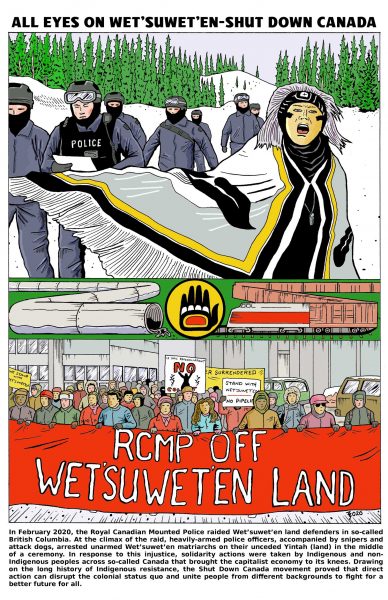 In February 2020, the Royal Canadian Mounted Police raided Wet’suwet’en land defenders in so-called British Columbia. At the climax of the raid, heavily-armed police officers, accompanied by snipers and attack dogs, arrested unarmed Wet’suwet’en matriarchs on their unceded Yintah (land) in the middle of a ceremony. In response to this injustice, solidarity actions were taken […]
In February 2020, the Royal Canadian Mounted Police raided Wet’suwet’en land defenders in so-called British Columbia. At the climax of the raid, heavily-armed police officers, accompanied by snipers and attack dogs, arrested unarmed Wet’suwet’en matriarchs on their unceded Yintah (land) in the middle of a ceremony. In response to this injustice, solidarity actions were taken […]

